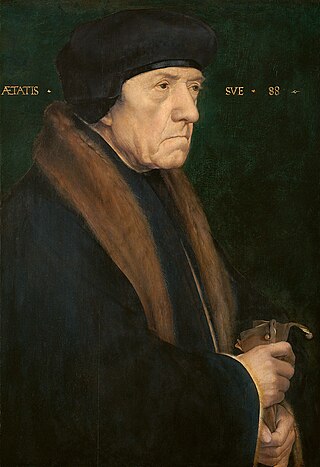Clerical career
Cliffe was commissary of the diocese of London between 1522 and 1529, instituted to the prebend of Twyford in St Paul's Cathedral in 1526. He was appointed archdeacon of London three years later, prebendary of Fenton in York Minster in 1532. He resigned the archdeaconry of London to become archdeacon of Cleveland in 1533, becoming precentor of York in 1534, and treasurer of York in 1538. [2]
On the suppression of the treasurer post in 1547, Cliffe was made dean of Chester. He kept this position for the rest of his life. [2] Two living he held were Waverton, Cheshire, from 1533, and Standish, Lancashire, from 1552. [1]
William Knight was the Secretary of State to Henry VIII of England, and Bishop of Bath and Wells.
Edmund Cosyn (Cosin) was an English Catholic academic and Vice-Chancellor of Cambridge University of the middle sixteenth century.
The Lady Margaret Professorship of Divinity is a senior professorship in Christ Church of the University of Oxford. The professorship was founded from the benefaction of Lady Margaret Beaufort (1443–1509), mother of Henry VII. Its holders were all priests until 2015, when Carol Harrison, a lay theologian, was appointed to the chair.
John Coldwell (c.1535–1596) was an English physician and bishop.
John Oliver was an English churchman, canon lawyer, courtier and Dean of Christ Church, Oxford.
Sir Matthew Carew was an English lawyer.
Richard Layton or Leighton (1500?–1544) was an English churchman, jurist and diplomat, dean of York and a principal agent of Henry VIII and Thomas Cromwell in the Dissolution of the Monasteries.
Thomas Bedyll (died 1537) was a divine and royal servant. He was royal chaplain and clerk of the Privy Council of Henry VIII, assisting him with the separation from Rome.
Hugh Ashton was an English churchman.
Ven. Henry Cotton was an English Anglican divine, ecclesiastical historian and author.
George Carew (1497/98–1583) was an English churchman who became Dean of Exeter.
George Heneage was an English churchman who became Dean of Lincoln.

Simon Haynes or Heynes was Dean of Exeter, Ambassador to France, and a signatory of the decree that invalidated the marriage of Henry VIII with Anne of Cleves. He became President of Queens' College at the University of Cambridge from 1529 to 1537, and toward the end of his life, was installed Canon of Windsor at Windsor Castle.
Edmund Castle (1698–1750) was an English churchman and academic, Master of Corpus Christi College, Cambridge from 1745, and Dean of Hereford in 1749.
Thomas Chapman (1717–1760) was an English churchman and academic, Master of Magdalene College, Cambridge from 1746.

John Chambre (1470–1549) was an English churchman, academic and physician.
Henry Montague Grover (1791–1866) was an English lawyer, cleric and writer.
Nicholas Hawkins, LL.D. (c.1495–1534) was an English cleric and diplomat.
Knightly Chetwood was an Anglican priest, poet, and translator.
John Freind Robinson, 1st Baronet was Archdeacon of Armagh from 1786 until his resignation in 1797.
This page is based on this
Wikipedia article Text is available under the
CC BY-SA 4.0 license; additional terms may apply.
Images, videos and audio are available under their respective licenses.
![]() This article incorporates text from a publication now in the public domain : Stephen, Leslie, ed. (1887). "Clyffe, William". Dictionary of National Biography . Vol. 11. London: Smith, Elder & Co.
This article incorporates text from a publication now in the public domain : Stephen, Leslie, ed. (1887). "Clyffe, William". Dictionary of National Biography . Vol. 11. London: Smith, Elder & Co.
